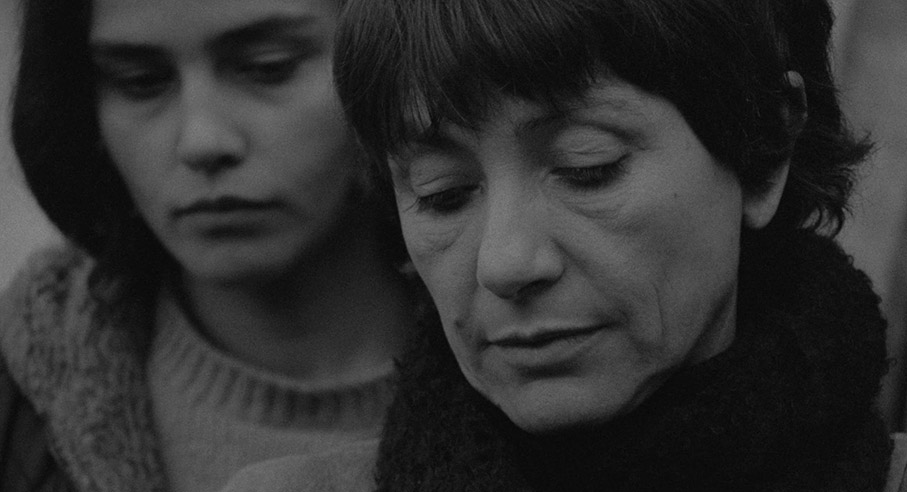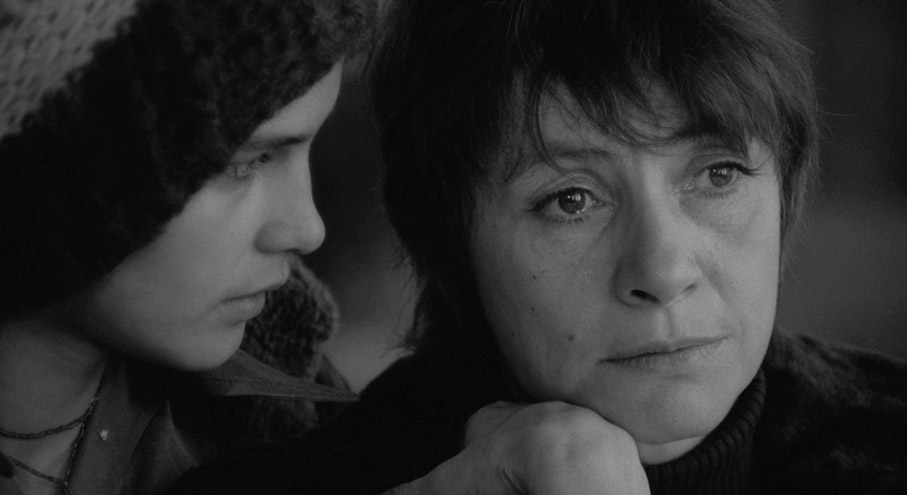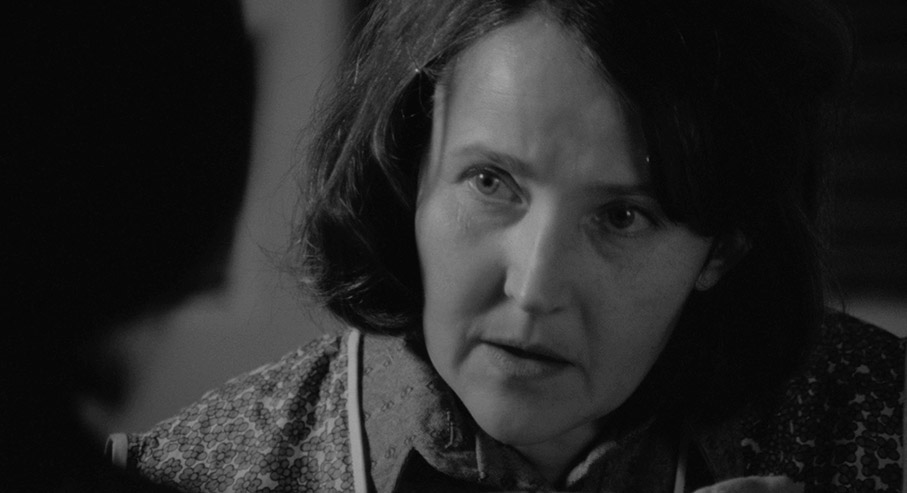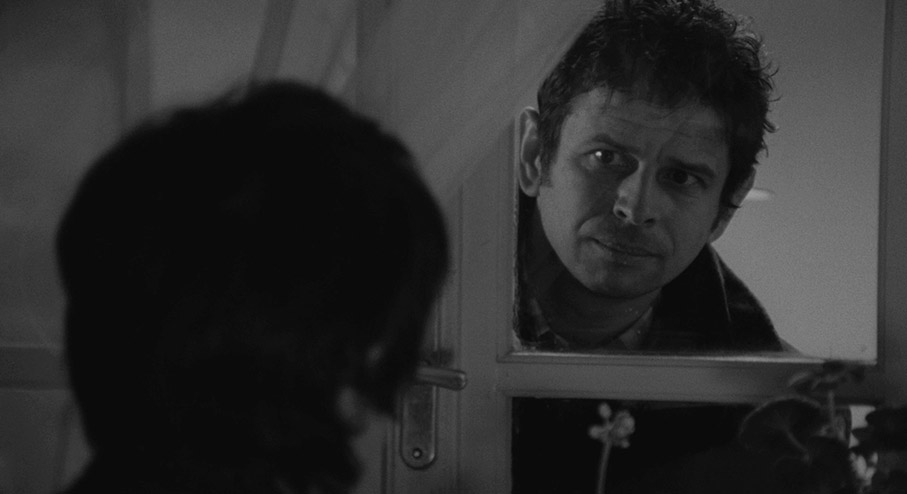|
I recently watched an interview with American film writer Chris Gore in which he was asked to define what makes a film special, and his response struck a chord with me. For him, one key identifier of great storytelling is when a film features a character who is markedly different from him as a viewer – in their gender, their background, their race, their experiences, or their beliefs – that he is still able to fully identify with for the running time of the film. With that thought in mind, consider my own relationship to the lead character of Márta Mészáros’s 1975 drama, Adoption [Örökbefogadás]. I was born and grew up in the UK and due to a range of circumstances – personal, circumstantial, financial – I have never fathered a child, but have also never had the urge to do so and have now reached a point in my life where it would be a biological and practical non-starter. The lead character of Adoption, meanwhile, is a 43-year-old Hungarian widow named Kata (Katalin Berek) who wants to have a child with her boyfriend Jóska (László Szabó), who’s against it. Hardly something I could immediately relate to, you might think. Indeed, knowing a little about the story in advance, I initially suspected that this was a film I would be respectful of but not be able to engage with fully on a personal level. How gloriously wrong that assumption proved to be.
Stories of women who want to become mothers and boyfriends who are considerably less keen on the idea are almost as common in film as they are in real life, but here there is a notable complication. Although Kata and Jóska have been together for several years, Jóska is married with children of his own, and he and Kata have agreed that divorcing his wife to be with his lover full-time is not a viable option. Whether this was initially stipulated by Jóska and agreed to by Kata or a decision reached in unison is never clarified either way. Nonetheless, Kata wants to have Jóska’s child, in part because she genuinely loves him but also because she aware that there will come a time in the not-too distant future when she will no longer be able to conceive. Later, it is revealed that it was financially impractical for Kata and her late husband to have children when he was alive, and now her biological clock is ticking, subtly symbolised by the alarm clock that wakes her as the film begins. Later that day, she undergoes a medical check to confirm that she is in good health and still able to conceive, and she has already calculated that the wage from her factory job will be enough to enable her to financially cope. Yet when she tells Jóska that she wants his child, he dismisses the very idea as madness, even when Kata assures him that she plans to raise the child alone.

Then something strange happens, and when I say strange, I realise that I’m likely the victim of a cultural difference or two. A small group of young girls from a nearby institute – a name given here to what is essentially an orphanage for abandoned and runaway girls – after observing and commenting on Kata when she meets Jóska in a park, approach Kata’s house and, instead of knocking on the front door as expected, walk unannounced into the adjacent woodwork shop in which Kata is working. Here they say a casual hello, ask her about what she’s doing in a manner that for me felt just a weeny bit intimidating (when one girl picks up a picture frame that Kata has made, I almost expected her to say, “Be a shame if something happened to it”), and then take their leave. I was certainly more bemused than the unflustered Kata. Then one of the girls, Anna (Gyöngyvér Vigh), returns to the workshop, remarks that Kata lives alone and has a spare room, then asks if she could use it to meet her boyfriend, a request that Kata is ultimately not comfortable with. “I thought you were all right,” Anna says as she departs, “but you’re just like the rest.” The next day, a friend of Anna’s walks into Kata’s house under the impression that Anna is lodging with her. When Kata corrects her misapprehension, the girl talks to her about a letter she has written to her mother and her new husband, one that lays out in detail the sort of troubled and abusive background that she and many of the institute girls have suffered. It clearly makes an impression on Kata, and the next day she visits the institute to talk to Anna, but is intercepted by a kindly director, who advises her to return during visiting hours. Later that day Anna turns up at Kata’s house, having run away from the institute. This time the more welcoming Kata invites her in.
Now it might seem, given Kata’s longing for a child, Anna’s estrangement from her parents, and a title with the potential to solve both dilemmas, that the direction of the subsequent narrative is effectively set in stone. Not so. For a start, when Anna rolls up at Kata’s door, we’re only 25 minutes into a film that runs for over three times that length, and while the bond that quickly develops between the two women does at one point prompt Kata to ask Anna to stay, Anna’s turbulent history with her estranged mother and father has soured her to the very idea of parental figures. Yet the friendship that develops between them is certainly akin to that of a caring mother and a supportive daughter, which temporarily provides both with the very things that have been missing from their lives until now. In a touching and unexpectedly intimate scene, Anna lies down beside Kata on her bed and offers words of support for her desire for a child whilst simultaneously warning her away from adoption. “Abandoned children are all wounded,” she tells her.

A key reason I found myself so quickly caring about Kata and her fate lies in the captivatingly lived-in naturalism of Katalin Berek’s performance, which at every turn feels less like the result of role research than life experience. Thus, when she matter-of-factly reveals to Jóska that she wants his child, his rejection of the idea, though logical for a couple in their situation, still hurts because of the impact that I knew it would ultimately have on Kata. It’s something she initially attempts to supress, but it bubbles up later as she tries and fails to compose a letter of apology and explanation to Jóska, who for my money doesn’t really deserve such a courtesy. It’s fortunate, and perhaps a little ironic, that the one time a discussion with Jóska about her desire for a child leaves Kata in tears, her substitute daughter is on hand to offer the very support and comfort that Jóska is unable to provide. On the flipside, when Kata comes home to discover that Anna and Sanyl are making love in the room in which Anna is now lodging, the awkwardness of the scene stems almost entirely from the Kata’s new maternal role. When she knocks on the door and asks Anna for her robe, there’s a suspicion, never confirmed, that she is doing so to disrupt behaviour she is uncomfortable with taking place under her own roof. Yet Kata later gets fully behind the young couple’s desire to marry and takes positive steps to tackle the barriers they face, even going as far as to impersonate an institute official to introduce Sanyl to Anna’s mother and stepfather, whose permission for the union is required but has so far been flatly refused.
There’s a particular intimacy with the characters here that is created in part by the dominance of facial close-ups in director and co-screenwriter Mészáros’s sensitive and unsentimental handling of her story and characters, with even slow pans around groups moving from face to face like the inquisitive gaze of a curious and concerned outsider. Occasionally, a single unassuming cutaway speaks volumes, as in the lingering close-up of the skin-cracked elbow of one of Kata’s co-workers, as telling an indication of the punishing conditions under which they work as the sawdust that hangs in the air like thick fog and is air-blown from the workers’ clothing and hair at the end of every shift. Primarily, though, the technique is employed to bond us to Kata and Anna on a very personal level, observing not just their actions but connecting us to even the most subtly expressed reactions and smallest flickers of emotion, whether quietly expressed or reluctantly supressed.
That this story is told from the point-of-view of its lead female characters is both unsurprising and appropriate. It’s to the considerable credit of director Mészáros and her co-writers Gyula Hernádi and Ferenc Grunwalsky that the film avoids moralising when it comes to Kata and Jóska’s relationship, even though it does feel increasingly like Jóska is used to getting his own way when it comes to such matters. In a sequence that initially had me shifting uncomfortably in my seat, Jóska somehow convinces Kata to accompany him home to meet his wife, Erszi (Flóra Kádár), a pleasant and instantly likeable woman whose desire to return to work now that their children are older is encouraged by Kata but flatly dismissed by Jóska. It’s perhaps symbolic that his decision is delivered from the kitchen, in which he has chosen to sit and eat alone, physically separated from the two women with whom he is involved, each of whom he has denied what they currently most desire.

I will admit that the bond I quickly formed with Kata was down in part to the similarity of a couple of aspects of life to my own, but these are personal touchstones that are in no way required to become completely involved her story. A couple of narrative and expositional shortcuts aside – when Kata has Anna’s friend read out the letter to her mother, it’s as much for our benefit as it is for hers – Adoption is an exquisitely handled study of both the maternal pull that leads individuals down a willing path to parenthood and how that decision can sometimes take a sour turn for everyone involved. Key to why the film exerts such a hold is that Mészáros makes this feel so personal an experience, working with her winningly naturalistic cast and cinematographer Lajos Koltai to create an intimacy with characters whose journey we are genuinely made to feel part of. It also serves as a perfect illustration of Chris Gore’s above-mentioned point regarding identification with a central character with whom you have seemingly little in common. For me, this aspect of the film succeeds not because I could now claim I understand what it is to be a maternal woman, but because I so strongly empathised with Kata as an individual, one whose feelings and needs I might not specifically share but that I can nonetheless relate to through my own life experiences. All we need now is to somehow convince more people in the real world to take a similarly empathic view of their fellow humans, regardless of their race, gender, background, or some other aspect of their being that continues to see them pejoratively labelled as different.
Sourced from a new restoration by the Hungarian National Digital Archive and Film Institute, the 1.85:1, 1080p transfer here is consistently clean, damage-free and with clearly defined detail, something especially evident in the many facial close-ups. Contrast is well balanced within a chosen aesthetic that sees the brightness turned down a couple of notches from the accepted norm, and considering the transfer was supervised by cinematographer Lajos Koltai, I must presume that this was intentional and likely intended as an expressionistic reflection of the emotional state of the lead characters. This does mean that if you have an OLED TV, as I have, the film is best watched in the evening when the ambient light levels have dropped a bit, but it does work for the film and otherwise looks fine. A fine film grain is visible throughout and there are no obvious signs of any digital enhancement.
The Linear PCM 2.0 mono soundtrack has the sort of dynamic range restrictions that are normal for an Eastern European title (and a fair few Western European ones as well) of this vintage, but all is otherwise clear and damage-free, with solid reproduction of dialogue and György Kovács’ melancholic score.
Optional English subtitles are activated by default.
Márta Mészáros introduces ‘Adoption’ (4:06)
An introduction to the film from its director, Márta Mészáros, filmed in Budapest in June of this year, when Mészáros was 89 years of age. She notes that the film was an important one for her due to its international success, the reasons for which she briefly ruminates on, as well as providing and personal viewpoint on its underlying themes.

Interview with Márta Mészáros (19:34)
A 2009 chat with a younger and more vibrant Mészáros, conducted in India by an unidentified interviewer and bearing a sizeable watermark of the web address of we can presume was once the production company or distributor, but which has since been vacated (and yes, I did check). Here, the prolific Mészáros (on IMDb, she has 67 film and TV directing credits) discusses the pessimistic world view of her films, the negative side of the dominant Hollywood product, how difficult it has become to raise money for new productions, the (then) current state of Hungarian cinema, and more. There are also several questions asked about her 1976 dramatic feature, Nine Months [Kilenc hónap], which I’m guessing was being screened at a film festival that Mészáros was attending when this interview was conducted.
Trailer (1:52)
A nicely assembled trailer created for what looks like a 2002 Cannes screening of what I presume was a previous restoration of the film – it’s certainly in good shape here but I was under the impression that the restoration featured on this disc was created more recently. It’s also – and this is so rare these days – safe to watch before the film as it judiciously avoids spoilers.
Also included is a Booklet containing a fascinating and thoughtful essay on Adoption by freelance journalist, critic and film programmer, Carmen Gray, plus the main credits for the film.
Despite a gentle pace and a lack of what might normally be described as action, I was utterly riveted by Adoption, a low-key drama that compels in the truth of its characters, the honesty of its portrayal of rarely discussed aspects of the society in which it was made, and the compelling and tender intimacy of its filmmaking. A strong restoration and transfer are backed by two welcome chats with director and co-writer Márta Mészáros and an excellent essay on the film by Carmen Gray. It’s a remarkable work with a well-earned reputation that is treated with the appropriate respect by this very fine Blu-ray release. Highly recommended.
|